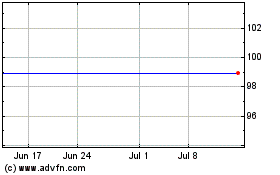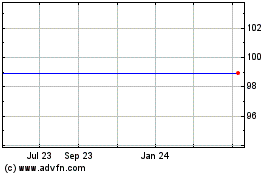By Thomas Gryta
AT&T Inc. can add Wall Street to the list of parties
skeptical of its $85.4 billion deal to buy Time Warner Inc.
Shares of Time Warner fell 3.1% to $86.74 on Monday while shares
of AT&T decreased 1.7% to $36.86.
The Monday price of Time Warner, trading about 18% below the
deal value, means the market is figuring about a 40% chance that
the deal will be approved, one arbitrage fund manager, who declined
to be identified, said Monday morning.
"There is a litany of things to worry about," said analyst Craig
Moffett with MoffettNathanson. "The deal faces a steep uphill climb
in Washington, and it obviously isn't helped by the fact that both
the Republicans and the Democrats have now come out against
it."
After the announcement of the transaction during the weekend,
lawmakers, media rivals, and politicians -- including Republican
presidential nominee Donald Trump and Democratic vice presidential
nominee Tim Kaine -- came out against the deal, calling for intense
regulatory review of concerns that it could hurt consumers and
concentrate too much media influence in one company.
Positioning the deal as the marriage of Time Warner's robust
content lineup with the carrier's millions of wireless and pay
television subscribers, AT&T Chief Executive Randall Stephenson
has argued that as a vertical combination, the deal won't trip some
of the antitrust triggers at the Justice Department.
"We're convinced that these type of issues can be handled with
conditions," Mr. Stephenson told analysts Monday.
But it isn't just the regulatory overhang that is concerning
Wall Street, which also called into question the industrial logic
of such a deal.
"We historically have not believed in the strategic benefits of
vertical integration," Citibank analyst Jason Bazinet wrote in a
note to clients. He cast doubt on the idea that owning a fixed or
mobile network provides media companies with better data to
customize their content, along with new advertising and
distribution opportunities beyond the traditional pay-TV model.
AT&T's Mr. Stephenson said owning content would make it
easier for the carrier to adapt to various platforms quickly in a
way that is time-consuming and difficult when it has to negotiate
contracts with content partners.
"It's slow, it's painful, just the contracting itself takes a
lot of time whereas when it's completely owned, you just move a lot
faster," he said Monday.
Analysts note that many of the attractive aspects of owning
content -- such as keeping it out of the hands of other
distributors or giving it free distribution -- would be barred by
regulators.
Still, not all investors have those concerns. By acquiring a
media company, AT&T should be able to diversify its business
while generating substantial free cash flow, said Jason
Abercrombie, a credit analyst at Newfleet Asset Management, which
has about $11.2 billion assets under management. The deal is a way
for AT&T executives to "hedge their bets" in an uncertain
environment, Mr. Abercrombie added.
Wells Fargo analyst Jennifer Fritzsche said the deal should give
AT&T leverage against competitors, such as Comcast Corp., along
with Amazon.com Inc. and other over-the-top players who own
content.
Comcast's acquisition of NBCUniversal went through in 2011 with
13 months of review, but some officials have expressed concern that
some of the conditions of the deal were difficult to monitor and
enforce.
Laura Martin, senior media analyst at Needham & Co., said
regrets about approval of the Comcast NBCUniversal deal are
creating an overhang. "It's 100% the regulatory spread," she said,
referring to the dip in Time Warner shares.
Antitrust authorities have taken a hard stance against deals and
the timing of this one -- coming two weeks before a presidential
election -- is confusing for many.
One arbitrage trader said Time Warner's share price Monday
translated to the market putting a 40% chance on approval. Another
said the regulatory unknowns are making it difficult to formulate a
trading strategy that won't pay off for another year.
Wall Street also is taking a hard look at other aspects of the
deal. They range from how it swells the carrier's already large
debt load to how it could take resources away from its wireless
network to how it could distract from integrating
satellite-television provider DirecTV, which it bought for nearly
$50 billion a year ago.
As part of the deal, AT&T -- already the largest
nonfinancial corporate issuer of dollar-denominated debt -- is
taking on $40 billion of bridge loans, adding to its current $119
billion in net debt.
Ratings companies Standard & Poor's and Moody's Investors
Service both put AT&T on review for downgrade, though both said
any downward move would be only one notch, meaning AT&T would
maintain its investment-grade rating.
But it leaves the company with little room to add new debt
because investors would get spooked having such a large balance
sheet so close to crossing over to junk-bond status, Moody's
analyst Mark Stodden said.
Mr. Stodden said the deal will give AT&T additional scale,
more growth potential and lower capital intensity, but a likely
rigorous regulatory review could include conditions that undermine
AT&T's ability to use Time Warner's content as a competitive
advantage.
The carrier also said the deal won't change its
network-construction spending although it may have to spend more to
keep up with the increased network load.
Mr. Stephenson said AT&T is prepared. It has 40 megahertz of
unused airwaves -- almost a quarter of its total holdings -- that
it plans to deploy specifically for video. The carrier also is
participating in a continuing government auction of wireless
airwaves.
"The more AT&T focuses on diversifying away from wireless
rather than investing in it, the more we like the position of the
challengers," said Jonathan Chaplin, an analyst at New Street
Research.
Ryan Knutson contributed to this article.
Write to Thomas Gryta at thomas.gryta@wsj.com
(END) Dow Jones Newswires
October 24, 2016 17:19 ET (21:19 GMT)
Copyright (c) 2016 Dow Jones & Company, Inc.
Time Warner (NYSE:TWX)
Historical Stock Chart
From Mar 2024 to Apr 2024

Time Warner (NYSE:TWX)
Historical Stock Chart
From Apr 2023 to Apr 2024
